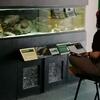Staff from Paignton Zoo Environmental Park and Viet Nature, a Vietnamese NGO, have been swapping tips and techniques on how to keep and rear Edward’s pheasant - a species that hasn’t been seen in the wild for nearly 20 years.
Three conservationists from Vietnam visited Paignton Zoo. Curator of Birds, Jo Gregson said: “The three who came here are trained foresters, so they know the habitat but not the birds. They’ve taken research methods and husbandry skills back that will help them in their efforts to save the Edward’s pheasant. Ultimately, you want local people to take ownership of their projects - our aim is to assist them in the early stages.”
The Vietnamese conservationists worked alongside Paignton Zoo keepers, learning about pheasant care and how to catch and ring birds safely. They had talks from other Zoo departments, including Education, Vets, Gardens and Field Conservation and Research, and met with representatives from the World Pheasant Association.
Meanwhile, 6,000 miles away in Vietnam, conservation NGO Viet Nature has built a project station near to the Knoc Trong forest. They are now building a small block of holding aviaries for the first breeding pairs of birds. Jo said: “The design of the aviaries has been carefully considered by zoo experts. Peter [Paignton Zoo Senior Head Keeper of Birds] will spend a few weeks working with the Vietnamese during construction, and will train staff based there on pheasant care.”
Paignton Zoo is working with Viet Nature to reintroduce the species to the forests from which it has been eradicated. Jo continued “There are a few Edward’s pheasants in Hanoi Zoo and they will be the first birds to be moved to the new holding pens at Knoc Trong. We hope that our work will help build a sound understanding of pheasant care which will continue to develop over time.”
Paignton Zoo is home to nine adult birds, four females and five males, and has successfully bred the species. Edwards’s pheasant (Lophura edwardsi) is listed as Critically Endangered and has not been seen in the wild since the year 2000. The species has suffered because of deforestation, hunting and the use of defoliants during the Vietnam War.
Related Members
-
NewsZSL leads Earth Day lessons for schoolchildren at 10 Downing Street 24th April, 2024Today, to mark Earth Day 2024, pupils from Greater Manchester, South Wales and London schools had the unique experience of stepping inside 10 Downing…
-
News
 Blog: Working for animal welfare really is worth the effort 24th April, 2024Evidence-based animal welfare needn’t be overwhelming writes Katie McDonald, Deana Stephens, and Paul Rose, members of BIAZA’s Animal Welfare…
Blog: Working for animal welfare really is worth the effort 24th April, 2024Evidence-based animal welfare needn’t be overwhelming writes Katie McDonald, Deana Stephens, and Paul Rose, members of BIAZA’s Animal Welfare… -
NewsBlog: Putting National Parks at the heart of nature recovery 19th April, 2024How much do National Parks contribute to conservation? Ruth Bradshaw (Campaign for National Parks) shares findings: 2024 marks the 75th anniversary of…


